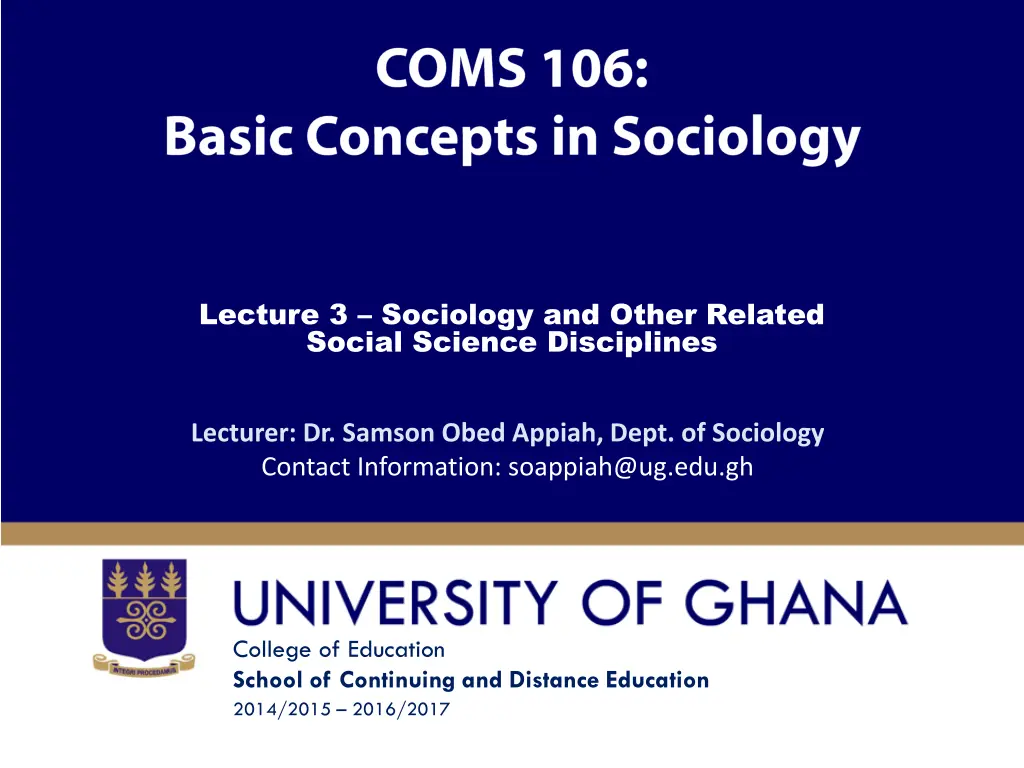
Understanding Sociology and Other Social Sciences
Explore the similarities and differences between sociology and related social science disciplines such as psychology, economics, anthropology, and history. Discover how sociology's approach to studying society sets it apart from other fields of study.
Download Presentation

Please find below an Image/Link to download the presentation.
The content on the website is provided AS IS for your information and personal use only. It may not be sold, licensed, or shared on other websites without obtaining consent from the author. If you encounter any issues during the download, it is possible that the publisher has removed the file from their server.
You are allowed to download the files provided on this website for personal or commercial use, subject to the condition that they are used lawfully. All files are the property of their respective owners.
The content on the website is provided AS IS for your information and personal use only. It may not be sold, licensed, or shared on other websites without obtaining consent from the author.
E N D
Presentation Transcript
Lecture 3 Sociology and Other Related Social Science Disciplines Lecturer: Dr. Samson Obed Appiah, Dept. of Sociology Contact Information: soappiah@ug.edu.gh College of Education School of Continuing and Distance Education 2014/2015 2016/2017
Lecture Overview Sociology is not the only subject which studies society and social interaction; Subjects like Economies, Psychology, Political Science, Social Anthropology and others also study aspects of social interaction and human behavior in society though not necessarily in the same way that Sociology does; This Lecture introduces students to the similarities and differences between Sociology and other social sciences in their study of society and social interactions. Slide 2
Lecture Objectives At the end of the lecture, the student will be able to: Understand the similarities between sociology and other social sciences; Identify and explain the specific differences between Sociology and Psychology, Anthropology, History and Economics; Identify the Scope of Sociology as an academic field. Slide 3
Sociology and other Social Sciences Sociology is not the only subject, which studies society and social interaction; Other subjects such as Economics, Psychology, History and Anthropology among others also study aspects of social interaction and society; Sociology therefore shares some similarities with the other social sciences as they all study human behavior in society; However, sociology s approach and interest in the study of behavior is not in the same way as the other social sciences. Slide 4
Sociology and other Social Sciences Cont. While other social sciences study society just as Sociology, their interest are limited to only aspects of social interaction, not the totality of it; Sociology, however, is interested in all aspects of social interaction; In this sense, what is the specialized fields of other related subjects is also the concern of sociology; Slide 5
Sociology and other Social Sciences Cont. Sociologists are of the view that, in order to get a full understanding of society; It must be studied in totality and not only aspects of it as in the case of the other disciplines; Therefore, political organization which is the field of political science is also of interest to sociology and it forms an important part of sociological studies; Slide 6
Sociology and other Social Sciences Cont. Again economic organization and behavior which are specialized fields of economics are also relevant to sociological analysis; This because economic interaction is social behavior; Its therefore not surprising that within sociology, important branches like Political Sociology, Economic Sociology, Sociology of Religion among others. Slide 7
Sociology and Psychology: Similarity and Difference Sociology is similar to Psychology because they both study human behavior in society; Psychology s interests lie in the processes and behaviors of the individual; Sociology is the scientific study of society and social behavior in a group/social setting or situation; The difference is that, Psychology s interest lies in processes and behavior relating to the individual, while Sociology looks at the collectivity (group). Slide 8
Sociology and Anthropology: Similarity and Difference The close resemblance between Sociology and (Social) Anthropology is because they both study human society; Social Anthropology studies cultures and social institutions of simple or preliterate societies; However, Sociology focuses on technologically developed or complex and modern societies; Slide 9
Sociology and Anthropology: Similarity and Difference Cont. While Anthropology deals with simple, traditional and small- scale societies; As such Sociology uses quantitative methods to study complex societies; Whiles Anthropology uses qualitative methods like participant observation in simple societies. Slide 10
Sociology and History: Similarity and Difference Sociology and History are similar because, they both society and human behavior in the past; Historical study is necessary for Sociological research; Sociology is interested in the knowledge of the past in order to understand the present and be able to predict the future; History delves into past events of societies while Sociology explores contemporary societies. Slide 11
Sociology and Economics: Similarity and Difference Sociology is similar to Economics since they both study economic behavior of people in society; Economic behavior, interaction and organization are all part of social behavior, interaction and society; As a result, Sociology is interested in the nature and types of social interactions within economic organizations in all societies; Slide 12
Sociology and Economics: Similarity and Difference Cont. Economics however deals with economic indicators such as demand and supply, price, savings and interest; While Sociology focuses on how these factors bring about stability and change in society with its effect on behavior. Slide 13
Sociology as a Synoptic Subject Sociology is a Synoptic Subject because it concerns itself with all aspects of social life; Even to the extent of dabbling in the specialized areas of other recognized disciplines; This however, does not make sociology a jack of all trades, and master of none; Because of its ambitious interest, it has developed its own methodology, theoretical perspective and orientation; Sociology looks at problems similar to other disciplines from a perspective which will make for a better understanding of how society as a whole works. Slide 14
Sociology as a Synoptic Subject Cont. For instance, religious beliefs and practices associated with the supernatural or God which is a domain of those in the Department of Religion; An important question for those in the Department of Religion may be whether or not God or the supernatural exists; However, this is not interest to the sociologist; Sociologists are interested in the supernatural only because whether it exists or not some people believe in its existence and this belief affects their behavior. Slide 15
Sociology as a Synoptic Subject Cont. This belief may either bring the people together or introduce conflict or division among them; Sociologists are also interested in the functions that beliefs and practices associated with the supernatural perform for society; Sociologists are interested in the social significance of religion, that is, what it does for society and its members; They want to ask what functions (manifest and latent) religion performs for society. Slide 16
The Scope of Sociology Identifying the scope of a subject as Sociology is not an easy task; There are, however, certain recurrent themes in every sociological work, which cannot be ignored; They include social institutions, culture, social deviance and social control, social stratification and social mobility; Others are research methods, social theory, social change and some leading personalities who contributed to the development of Sociology. Slide 17
Sample Question Sociology is a synoptic subject because it concerns itself with all aspects of social life and even dabbles in the specialized areas of other recognized disciplines. Does that make it a jack of all trades, and master of none? Slide 18
Reading List/References Robertson, Ian (1987). Sociology. New York: Worth Publications; Schaefer, Richard T. (2004). Sociology: A Brief Introduction. (5TH Edition) Boston: McGraw Hill Companies, Inc; Vander Zanden, J.W,(1990). Sociology: The Core. New York: McGraw-Hill. Slide 19



















